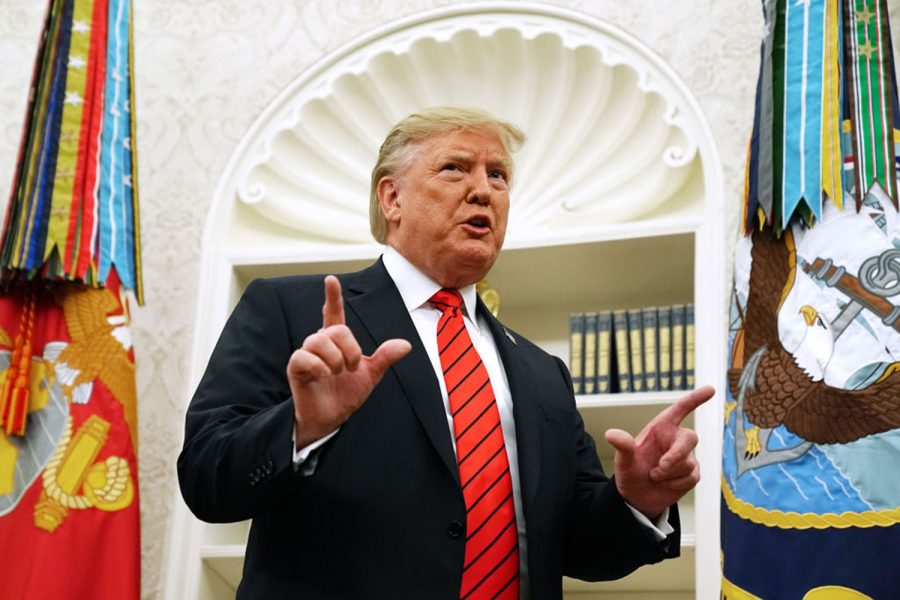Opinion: Environmental policy is moving backward
With climate crisis and other ecological perils looming, the U.S. isn’t just ignoring the problems, it’s making them worse.
U.S. President Donald Trump gives pauses to answer a reporters’s question about a whistleblower as he leaves the Oval Office after hosting the ceremonial swearing in of Labor Secretary Eugene Scalia at the White House September 30, 2019 in Washington, DC. (Chip Somodevilla/Getty Images/TNS)
November 7, 2019
It’s been a bad-news week for the environment. The attack on the Clean Water Act continued in the Supreme Court. California is definitely still on fire (and it’s definitely because of climate change). Basically, we’re going backward in maintaining the one planet we have.
The worst news came Monday — we’re officially scheduled to pull out of the Paris Agreement a year from now.
We’ve long known that the Republican Party in general and President Trump in particular are anti-Earth, but it feels more real now. As the world’s leading nation, we’ve given up on international cooperation against the greatest threat to humankind.
After the 2016 election, it wasn’t unexpected that America would take back our word on the United Nations’ historic climate accords. Trump campaigned hard against most anything that would be good for the planet and the 8 billion people who live on it. On the debate stage, he went so far as to call for eliminating of the Department of Environmental Protection (which is a truly extremist position given that it doesn’t exist).
So, what should we do now that we’ve told the globe that the U.S. is pro-self-sabotage in regards to the future of the species?
We’ve long known that the Republican Party in general and President Trump in particular are anti-Earth, but it feels more real now.
For starters, federalism can be helpful. In 2017, then-California Gov. Jerry Brown, a Democrat, went to Europe to assure our allies that his Golden State would abide by its climate goals despite the GOP president because “unless everyone contributes to the solution, then the job won’t get done.”
Other sane state and local leaders have made similar pledges to do work within their jurisdictions to fight the global ecological crisis. We don’t have to go to the West Coast either. Iowa City City Councilor-elect Janice Weiner told The Daily Iowan she plans to continue to push the city toward a sustainable future as much as possible.
“We can’t, as a city, mandate anything stricter than what state and federal regulations require,” Weiner said. “But we can be creative.”
These sort of smaller-level efforts are meaningful and commendable. The more people aware of the magnitude of the crisis, doing what they can, and promoting further action — the better. However, it’s not enough. The U.S. must be an indivisible nation against worldwide climate change.
But instead of that, we’re doing nothing.
It’s not as if we’re holding out of the Paris Agreement as some sort of protest, like the goals aren’t as ambitious as they should be. (That was something Nicaragua did in 2015, and they’ve since signed onto the treaty.)
The U.S. must be an indivisible nation against worldwide climate change.
In fact, the Paris Agreement isn’t really binding. It’s mostly just a set of individual goals for each country. Everyone pledged how they will cut their own carbon emissions to slow global warming, and there’s no real punishment for failing to meet those targets.
If that sounds a little wishy-washy, it’s because it is. The true power in the Paris Agreement is its momentous achievement of getting virtually every country — from Canada and Mexico, to Russia and China — to agree that climate change must be dealt with by everyone. And we pulled out because our president likes believing things that aren’t true. Essentially, the U.S. has said it doesn’t care.
So, again, what should we do?
The next federal government of our country must take immediate and far-reaching action in the name of fighting climate change. The specifics of those actions are a discussion for another time. For now, we must elect a new leader and we must commit to taking any action at all. It won’t be enough to announce “just kidding, we’re back” at the UN in January 2021.
If we’re going to make America great, we have to go forward. For the time being, we’re stuck in reverse.















